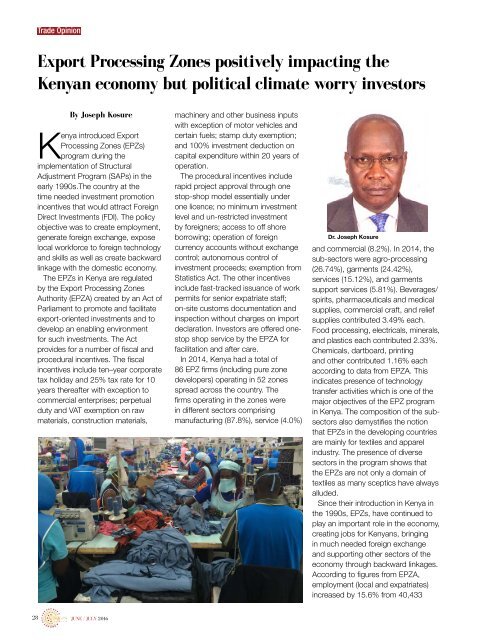Origin Africa Magazine 2nd Edition
You also want an ePaper? Increase the reach of your titles
YUMPU automatically turns print PDFs into web optimized ePapers that Google loves.
Trade Opinion<br />
Export Processing Zones positively impacting the<br />
Kenyan economy but political climate worry investors<br />
By Joseph Kosure<br />
Kenya introduced Export<br />
Processing Zones (EPZs)<br />
program during the<br />
implementation of Structural<br />
Adjustment Program (SAPs) in the<br />
early 1990s.The country at the<br />
time needed investment promotion<br />
incentives that would attract Foreign<br />
Direct Investments (FDI). The policy<br />
objective was to create employment,<br />
generate foreign exchange, expose<br />
local workforce to foreign technology<br />
and skills as well as create backward<br />
linkage with the domestic economy.<br />
The EPZs in Kenya are regulated<br />
by the Export Processing Zones<br />
Authority (EPZA) created by an Act of<br />
Parliament to promote and facilitate<br />
export-oriented investments and to<br />
develop an enabling environment<br />
for such investments. The Act<br />
provides for a number of fiscal and<br />
procedural incentives. The fiscal<br />
incentives include ten–year corporate<br />
tax holiday and 25% tax rate for 10<br />
years thereafter with exception to<br />
commercial enterprises; perpetual<br />
duty and VAT exemption on raw<br />
materials, construction materials,<br />
machinery and other business inputs<br />
with exception of motor vehicles and<br />
certain fuels; stamp duty exemption;<br />
and 100% investment deduction on<br />
capital expenditure within 20 years of<br />
operation.<br />
The procedural incentives include<br />
rapid project approval through one<br />
stop-shop model essentially under<br />
one licence; no minimum investment<br />
level and un-restricted investment<br />
by foreigners; access to off shore<br />
borrowing; operation of foreign<br />
currency accounts without exchange<br />
control; autonomous control of<br />
investment proceeds; exemption from<br />
Statistics Act. The other incentives<br />
include fast-tracked issuance of work<br />
permits for senior expatriate staff;<br />
on-site customs documentation and<br />
inspection without charges on import<br />
declaration. Investors are offered onestop<br />
shop service by the EPZA for<br />
facilitation and after care.<br />
In 2014, Kenya had a total of<br />
86 EPZ firms (including pure zone<br />
developers) operating in 52 zones<br />
spread across the country. The<br />
firms operating in the zones were<br />
in different sectors comprising<br />
manufacturing (87.8%), service (4.0%)<br />
Dr. Joseph Kosure<br />
and commercial (8.2%). In 2014, the<br />
sub-sectors were agro-processing<br />
(26.74%), garments (24.42%),<br />
services (15.12%), and garments<br />
support services (5.81%). Beverages/<br />
spirits, pharmaceuticals and medical<br />
supplies, commercial craft, and relief<br />
supplies contributed 3.49% each.<br />
Food processing, electricals, minerals,<br />
and plastics each contributed 2.33%.<br />
Chemicals, dartboard, printing<br />
and other contributed 1.16% each<br />
according to data from EPZA. This<br />
indicates presence of technology<br />
transfer activities which is one of the<br />
major objectives of the EPZ program<br />
in Kenya. The composition of the subsectors<br />
also demystifies the notion<br />
that EPZs in the developing countries<br />
are mainly for textiles and apparel<br />
industry. The presence of diverse<br />
sectors in the program shows that<br />
the EPZs are not only a domain of<br />
textiles as many sceptics have always<br />
alluded.<br />
Since their introduction in Kenya in<br />
the 1990s, EPZs, have continued to<br />
play an important role in the economy,<br />
creating jobs for Kenyans, bringing<br />
in much needed foreign exchange<br />
and supporting other sectors of the<br />
economy through backward linkages.<br />
According to figures from EPZA,<br />
employment (local and expatriates)<br />
increased by 15.6% from 40,433<br />
28 JUNE / JULY 2016



